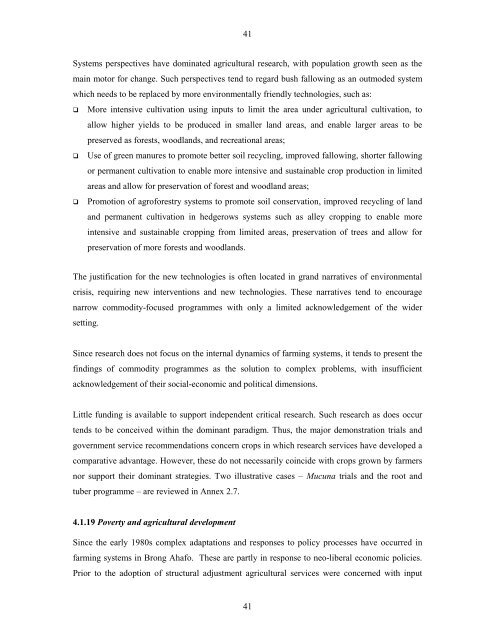Poverty Dimensions of Public Governance and Forest Management ...
Poverty Dimensions of Public Governance and Forest Management ...
Poverty Dimensions of Public Governance and Forest Management ...
You also want an ePaper? Increase the reach of your titles
YUMPU automatically turns print PDFs into web optimized ePapers that Google loves.
41<br />
Systems perspectives have dominated agricultural research, with population growth seen as the<br />
main motor for change. Such perspectives tend to regard bush fallowing as an outmoded system<br />
which needs to be replaced by more environmentally friendly technologies, such as:<br />
" More intensive cultivation using inputs to limit the area under agricultural cultivation, to<br />
allow higher yields to be produced in smaller l<strong>and</strong> areas, <strong>and</strong> enable larger areas to be<br />
preserved as forests, woodl<strong>and</strong>s, <strong>and</strong> recreational areas;<br />
" Use <strong>of</strong> green manures to promote better soil recycling, improved fallowing, shorter fallowing<br />
or permanent cultivation to enable more intensive <strong>and</strong> sustainable crop production in limited<br />
areas <strong>and</strong> allow for preservation <strong>of</strong> forest <strong>and</strong> woodl<strong>and</strong> areas;<br />
" Promotion <strong>of</strong> agr<strong>of</strong>orestry systems to promote soil conservation, improved recycling <strong>of</strong> l<strong>and</strong><br />
<strong>and</strong> permanent cultivation in hedgerows systems such as alley cropping to enable more<br />
intensive <strong>and</strong> sustainable cropping from limited areas, preservation <strong>of</strong> trees <strong>and</strong> allow for<br />
preservation <strong>of</strong> more forests <strong>and</strong> woodl<strong>and</strong>s.<br />
The justification for the new technologies is <strong>of</strong>ten located in gr<strong>and</strong> narratives <strong>of</strong> environmental<br />
crisis, requiring new interventions <strong>and</strong> new technologies. These narratives tend to encourage<br />
narrow commodity-focused programmes with only a limited acknowledgement <strong>of</strong> the wider<br />
setting.<br />
Since research does not focus on the internal dynamics <strong>of</strong> farming systems, it tends to present the<br />
findings <strong>of</strong> commodity programmes as the solution to complex problems, with insufficient<br />
acknowledgement <strong>of</strong> their social-economic <strong>and</strong> political dimensions.<br />
Little funding is available to support independent critical research. Such research as does occur<br />
tends to be conceived within the dominant paradigm. Thus, the major demonstration trials <strong>and</strong><br />
government service recommendations concern crops in which research services have developed a<br />
comparative advantage. However, these do not necessarily coincide with crops grown by farmers<br />
nor support their dominant strategies. Two illustrative cases – Mucuna trials <strong>and</strong> the root <strong>and</strong><br />
tuber programme – are reviewed in Annex 2.7.<br />
4.1.19 <strong>Poverty</strong> <strong>and</strong> agricultural development<br />
Since the early 1980s complex adaptations <strong>and</strong> responses to policy processes have occurred in<br />
farming systems in Brong Ahafo. These are partly in response to neo-liberal economic policies.<br />
Prior to the adoption <strong>of</strong> structural adjustment agricultural services were concerned with input<br />
41
















